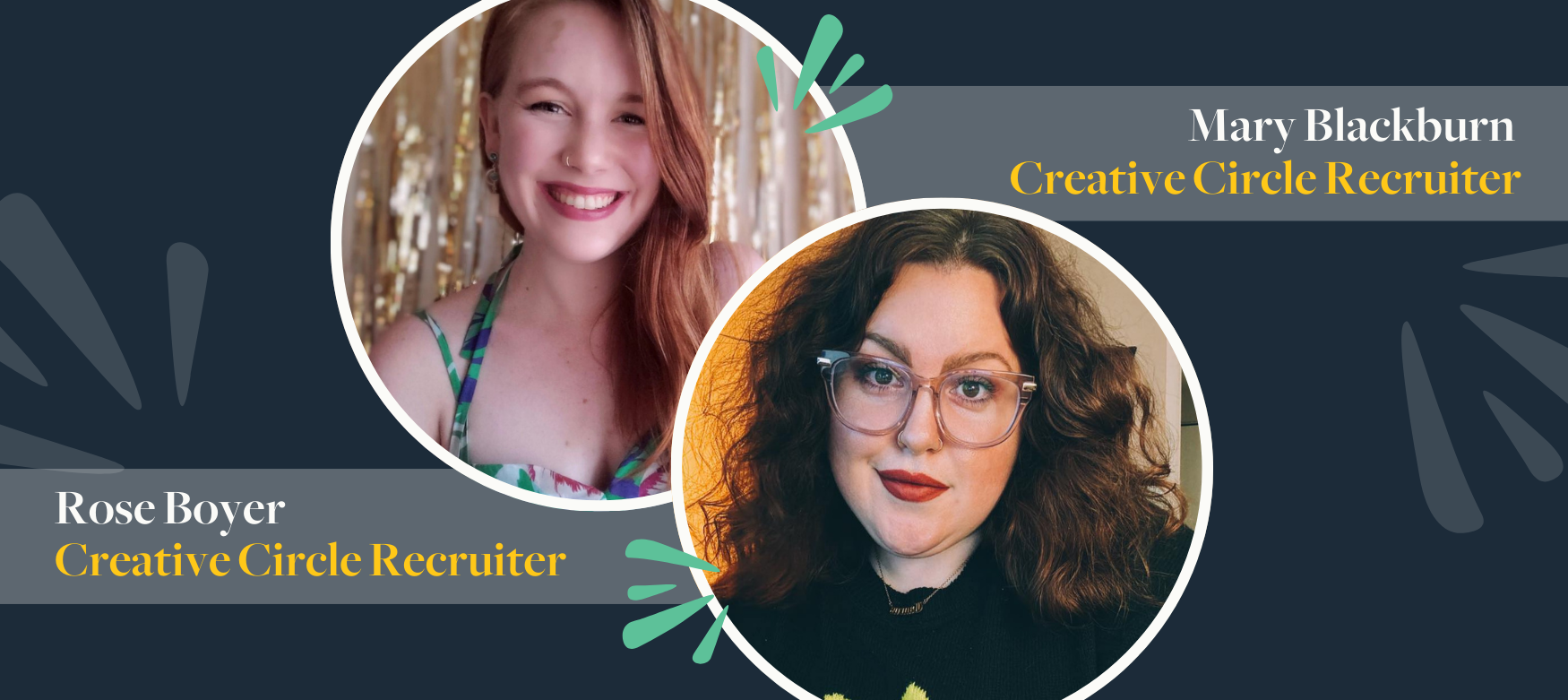If you’ve never worked with a staffing agency, you might not have any idea what a company like Creative Circle does. I certainly didn’t. In my early 20s, I had landed at a digital agency, but felt undervalued in my role and could tell things were not going well for the company. (They folded about a year later.) As I was looking for my next move, the job hunt felt all-consuming and overwhelming. My roommate at the time noticed my frustration and suggested I try Creative Circle. He had gotten a few freelance gigs through them and said it was worth a shot. Little did I know, I’d end up spending the next three years as a recruiter in the New York office.
Over those years, I learned that Creative Circle strives to be more than just a staffing agency. It’s not just about job placements, but about being partners and advocates for the candidates and clients they connect with every day.
The production team is split in two.
Account executives (AEs) connect with digital and creative teams who either don’t have internal recruiting teams or just need a little extra help for urgent projects or difficult roles.
Recruiters serve as partners to candidates, helping them best present themselves and matching them with opportunities that might be a good fit.
I spoke to a few recruiters across the country to give you an idea of what candidates can expect when working with Creative Circle.
Zach Ryan
Zach is a recruiter for the Washington, D.C. team who sees himself as a partner and advocate for every candidate he meets.
How do you approach the role?
“We want to get to know candidates professionally in terms of what someone has done, what they’re capable of, and what they want to do. The goal is matching what they’re looking for and their skillsets. From there it’s trying to position them in the best way for those opportunities.”
What’s a challenge?
“We get a ton of people who always want to be put up for everything and get frustrated when they’re not hearing responses.”
How does that show up?
“Someone might respond back to a role thinking they’re perfect, but if the client has shown me what they’re looking for in a portfolio, it’s a disservice to get someone excited about a role if their work doesn’t line up with that. I can’t submit someone if they’re not going to be a fit.”
What’s the best part of the job?
“Getting to call somebody when they land a role is the best part without question. Last week, I thought a job was for one role, and they ended up hiring both people they interviewed. That was really great.”
What’s your advice to candidates?
“Keep resumes brief but informative. You want to leave stuff to talk about in an interview. There needs to be balance and a focus on key words.
“Research prior to interviews. You never know what an interviewer’s expectation is, and you can use your recruiter as a research tool. Make sure you have questions.
“If a recruiter calls you about a job, there’s no harm in taking a conversation. If you have reservations, you can make sure you ask whatever questions. That way, there’s no regret or thought about whether or not you should have taken that role.”
Lauren Madden
What are the newer challenges you’re facing after COVID-19 forced so many roles to be remote?
“It’s different now because so much is remote. I have thousands of unread LinkedIn applications because people are applying to things all over the country. It’s impossible for me to get back to everyone. I think the remote workforce has really changed the way we’re recruiting.
“The landscape has opened up so many new opportunities, including opportunities to work with non-local clients. That’s great because there’s just more on the table, but it’s also really challenging from the relationship piece because I like to know my candidates. I like to know my clients and what their pain points are. But if you don’t get to know them or the hiring manager you lose that.”
How are you coping with that?
“I tend to gravitate towards people with whom I have longstanding relationships. When you don’t have face-to-face contact, we have to build trust virtually so I know I can trust them when an assignment comes up.”
What’s your advice to candidates?
“Having relationships with recruiters in multiple markets can be a way to guarantee you’re being considered.”
What makes Creative Circle different?
“We care about our clients and candidates. I know there are other staffing agencies that push resumes around, but we take the time to get to know what people want and need and help solve their problems.”
“Recently, I was working with a candidate who was somewhat newer out of school in front of a job with us and an agency on his own. The job I had was more money, but moving slower. We had a frank conversation that included questions like: What does this job do for you five years from now? What are your bigger career goals?
“I tried to be very neutral because I knew he was anxious about money in the COVID-19 landscape. It turned out the role through us ended up offering $20K more than the other company and was better for his career path. He was so happy with his choice. That’s what I love.”
Brian Pope
Brian is a senior recruiter for the Boston team. He stresses a golden rule with every candidate he meets: “If all else fails, you can reach out and course correct.” To candidates, he stresses that “We’re not doing our job if you’ve been interviewed and onboarded and don’t feel like you’re being looked out for.”
“At our best moments we are consultative with our candidates,” Brian says. “Even if I don’t get you a job, I want to help you.”
And Brian, along with many other CC recruiters, does that by consulting on resumes, portfolios, interview skills, presentation, and everything else that might come up during your job search.
“If we’re not calling folks about opportunities, it’s because we don’t feel like we can place them in a role at this point,” he says. “But, there are a ton of free resources on our website to help them hone their skills.”
Brian understands it can be frustrating to not hear back when you’re applying, because he was once there.
“My first portfolio was a bunch of sheets of paper. I had no idea what was expected. I wouldn’t have called me,” he says. So, sometimes presentation and experience can play a role. “I had to take classes and refine my portfolio,” Brian explained.
There’s always time, and a ton of resources, to get you where you want to be!
Tips and Considerations When Working with Creative Circle
If you’re a candidate working with Creative Circle, here are a few things to keep in mind.
- Remember, Creative Circle doesn’t charge candidates a fee. A staffing agency provides a service to clients who pay to outsource their recruiting needs.
- Make sure you read the entirety of the email when you apply to job listings and highlight why you’re a great fit for the position. Often, clients have very specific needs so if they’re asking for specific industry, vertical, or agency experience, make sure to highlight where you have that experience, what pieces in your portfolio are relevant, and why else you’re the right match for the role.
- If you’re getting emails that don’t seem to line up with what you’re looking for, connect with the recruiter that originally emailed you. Maybe there’s something in your file that needs to be updated.
- Remember your recruiter is your advocate, but that doesn’t mean they can submit you for everything and anything under the sun. They want to position you for roles you’ll be successful in.
- If you’re a candidate that hasn’t yet been interviewed by a recruiter within Creative Circle, here’s how you may or may not find that connection.
- Check to make sure you’re submitting your information through the proper channels and in a timely matter. A recruiter may miss your resume if they’re being inundated with responses or it’s not coming through the places they check most. Remember, recruiters are humans, too, and only have so many hours in a day to review resumes.
- If you are, and not hearing back, make sure you’re a good fit for Creative Circle. If most of your experience is in sales, finance, law, healthcare, or another industry that’s out of our core of digital, marketing, and creative, the recruiters reviewing your resume may not think they can help you and don’t want to waste your time.
- Make sure your resume and portfolio properly reflect your experience and what you’re looking for. If you’re a designer, make sure your resume shows off your style. Creatives should absolutely get creative with their resume and refrain from a standard template or a Word document.
About the author.
Alessandra is the mentor, educator, and writer behind Boneseed, a private practice devoted to deep self-inquiry through a range of physical, energetic, and mental modalities. She has over 500 hours of yoga, mentorship, and facilitation training and can be found slinging knowledge on her website, newsletter, and @bone.seed.



